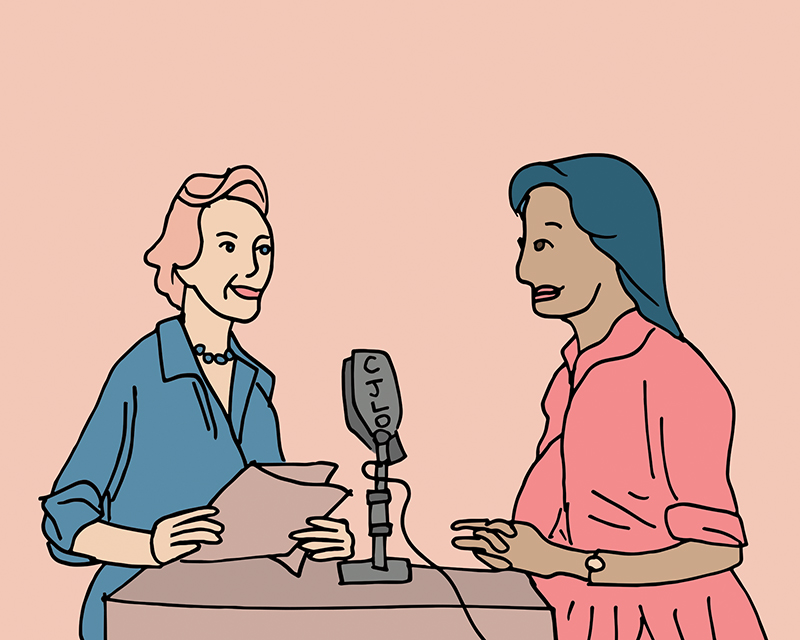Feminist radio group to provide a space for women working in the media
The first time Safia Ahmad felt discriminated against in the workplace was through an e-mail chain. Early in her career, she had pitched a sports story to an editor and was told that she could run the story as long as she didn’t “fangirl” over it.
Ahmad is the current media relations manager for Les Canadiennes de Montreal, the city’s professional women’s hockey team. She is also a freelance journalist, a Concordia alumna with a graduate diploma in journalism and a former reporting intern for the Montreal Gazette. In the one sentence shot back at her by a male sports editor, all of her qualifications were seemingly outweighed by one detail—she happened to be a woman.
For many female journalists like Ahmad, sexual harassment, discrimination and condescension have always been consistent and frustrating obstacles in the workplace.
“Whether you’re a woman working in sports, politics, business or all of the above, you will unfortunately face some form of discrimination by virtue of your gender,” Ahmad said. “There’s not a month—or week, quite frankly—that goes by without someone questioning a woman’s intelligence or credibility.”
Ahmad said she has seen this often throughout her work in sports journalism. She said when men make mistakes in their work, they are often simply dismissed as errors. When a woman makes a mistake, however, her entire intellectual capacity is brought into question.
“A woman has to work twice as hard as a man to prove herself and it’s unacceptable,” Ahmad said. “This is a double-standard that women continue to face every day.”
Ahmad is not alone in her beliefs or experiences. Allison O’Reilly and Mackenzie Smedmor of CJLO have experienced similar hardships due to their gender identity while working in the media. This inspired them to team up and create the new CJLO Women’s+ Collective.
According to their Facebook page, the collective was developed to encourage the involvement of self-identifying women and other gender minorities in community radio. Whether they participate as programmers, hosts, producers or artists, members strive to shed light on women’s issues and diversify the voices heard on air.
“Allison and I started the CJLO Women’s+ Collective because we aren’t satisfied with [the current gender representation at the station], as male hosts outnumber women on the programme grid,” Smedmor said. “We were also upset to learn about a lack of feminist student groups at Concordia, so we created one.”
O’Reilly is currently the program director at CJLO. She said that when she first got the job, she learned that only 20 per cent of the DJs at the station were women. O’Reilly said she knew something had to be done to make the numbers more proportional.
“I honestly believe that, since women are a minority in media jobs, especially technical jobs such as audio engineering and recording, they are treated negatively,” O’Reilly said. “They are seen as not being able to perform as effectively as the men in the industry, therefore making it a hostile industry for women to break into.”
O’Reilly said she has experienced this hostility herself throughout her career in radio.
“I’ve had people come to my board and try to tell me how to work it. I’ve had people try to take over while I’m setting up equipment and tell me what I’m doing wrong. I’ve had people not believe me when I tell them my profession. They are almost always men,” she said.
The CJLO Women’s+ Collective will play a large part in combatting these injustices, according to Smedmor.
“It’s very important to Allison and me to create an environment where women and non-binary folks can learn and express themselves and unapologetically fill airtime,” Smedmor said. “It’s not enough to bring media-trained women into the community—they need to feel confident that their contributions are valuable and important.”
Among other things, Smedmor and O’Reilly said the collective mainly aims to benefit the community by bringing forward feminist issues and focusing on women and non-binary artists who are usually marginalized by mainstream media. They plan to do so by hosting two shows—Yonic Youth and Femme AM—that rotate every Thursday at 2 p.m., and developing future projects that will be announced soon.
To young women entering the workforce in fields like journalism and communications, Ahmad says it’s important to stand up for what you believe in.
“There will be times when people will criticize you or make comments that target your gender. I would encourage you to speak up,” Ahmad said. “Women have been socialized to internalize and keep quiet. I think it’s time we break that cycle because we deserve as much respect as our male counterparts.”
Students interested in the CJLO Women’s+ Collective can contact Smedmor and O’Reilly by e-mail at [email protected] or like them on Facebook.
Graphic by Zeze Le Lin




